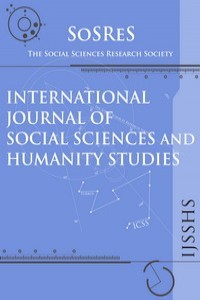ADDRESSING TRAINEES’ CONCERNS IN A PROFESSIONAL DEVELOPMENT PROGRAMME FOR INNOVATIVE TEACHING AND LEARNING
ADDRESSING TRAINEES’ CONCERNS IN A PROFESSIONAL DEVELOPMENT PROGRAMME FOR INNOVATIVE TEACHING AND LEARNING
Staff development, Trainees, Concerns, Innovative teaching Learning, Training,
___
- Behari-Leak, K. (2017). New academics, new higher education contexts: a critical perspective on professional development. Teaching in Higher Education, 22(5), 485-500.
- Botha, J. & Coetzee, M. (2012). The systematic training cycle. In M. Coetzee (Ed.) Practicing Training and Development in South African Organisations (pp.238-279). Cape Town: Juta.
- Bothwell, E. (2016). Moocs can transform education – but not yet. https://www.timeshighereducation.com/features/massive-open-online-coursesmoocs-can-transform-education-but-not-yet. Accessed 2018/02/18.
- Burns, M. (2015). 4 Barriers to teachers’ professional development in fragile contexts. Not all barriers can always be addressed, but some can. https://www.globalpartnership.org/blog/4-barriers-teachers-professionaldevelopment-fragile-/contexts. Accessed: 2018/06/22.
- Denzin, N.K. & Lincoln, Y.S. (2005). Qualitative Research. 3rd ed. Thousand Oaks: Sage.
- Dickhauser, O., Butler, R., & Tonjes, B. (2007). Das Zeigt doch nur, dass inch’s nicht kann-Zielorientierung und gegenuber Hilf bei Lehramtisan wartern [That just shows that I can’t do it: Goal orientation and attitudes concerning help among pre-service teachers]. Zeitschrift fur Entwicklung spsycholgie und padagogische psychlogie, 39, 120 -126.
- Englander, M. (2012). The interview: data collection in descriptive phenomenological human science research. Journal of Phenomenological Psychology. 43(1), 13-35.
- European Commission. (2017). An agenda for modernisation of higher education. https://ec.europa.eu/education/sites/education/files/he-com-2017-247_en.pdf. Accessed 2018/6/27
- Gall, M.D., Gall, J.P. & Borg, W.R. (2007). Educational Research: An Introduction (8th ed.). Boston: Pearson.
- Giorgi, A. (2009). The Descriptive Phenomenological Method In Psychology: A Modified Husserlian Approach. Pittsburgh, PA: Duquesne University Press.
- Giorgi, A.P. & Giorgi, B.M. (2003). The descriptive phenomenological psychological method. In P. Comic, J. E. Rhodes and L. Yardley (Eds.). Qualitative Research In Psychology (pp.243-273). Washington DC: American Psychological Association.
- Hall, G. & Hord, S. (1987). Change In Schools: Facilitating The Process. Albany, NY. State: University of New York.
- Hall, G.E., George, A. & Rutherford, W. (1979). Measuring stages of concern about the innovation: A manual for the use of SoC questionnaire (Report no. 3032). Austin: The University of Texas, Research and Development Center for Teacher Education.
- Hemmington, N. (2009). Creating a culture of lifelong learning at work. Fifth annual Tourism Human Resource Conference, Curacao. Available at: http://www.onecaribbean.org/content/files/lifelongnigelhemmington.pdf. Accessed: 2018/6/13
- Horsley, D. & Loucks-Horsley, S. (1998). CBAM Brings Order to the Tornado of Change. Journal of Staff Development. 19(4), 17-20
- Isabirye, A.K. & Moloi, K.C. (2013). Professional Development and its Implications for Innovative Teaching and Learning in one South African Higher Education Institution. Mediterranean Journal of Social Sciences, 4(14), 101-108.
- Isabirye, AK. (2015). Staff development for innovative teaching and learning at the University of South Africa. Doctoral dissertation. Pretoria. University of South Africa.
- Isabirye, AK. , & Makoe, M. (2018). Phenomenological analysis of the lived experiences of academics who participated in the professional development at an Open Distance Learning (ODL) university in South Africa. Indo-Pacific journal of Phenomenology, 18(1), 2079-7222.
- Kearsley, G. & Blomeyer, R. (2004). Preparing K-12 teachers to teach online. http://home.sprynet.com/~gkearsley/TeachingOnline.htm .Accessed 2018/6/16.
- Leu, E. & Ginsburg, M. (2011). First Principles: Designing Effective Education Program For In-Service Lecturer Professional Development. Washington, DC: USAID.
- Maritz, J. & Visagie, R (2010). Methodological Rigour and Ethics of Accountability within a Qualitative framework. Paper presented to academic staff at Unisa. Pretoria.
- McCarthy, B. (1982). Improving staff development through CBAM and 4Mat. Educational Leadership, 40(1), 20-25.
- Marwala, T.(2017). SA must connect to the fourth industrial revolution. www.thenewage.co.za/sa-must-connect-to-the-fourth-industrial-revolution. Accessed: 2018/2/18.
- Mushemeza, E.D. (2016). Opportunities and challenges of academic staff in Higher Education in Africa. International Journal of Higher Education, 5(3): 236- 246.
- Poro, A.(2017). The Fourth Industrial Revolution: Are developing countries keeping up? https://mg.co.za/article/2017-12-08-the-fourth-industrial-revolutionare-developing-countries-keeping-up Accessed 2018/2/18.
- Sadala, M.L.A. & Adorno, and R.C.F. (2002) Phenomenology as a method to investigate the experience lived: a perspective from Husserl and Merleau Ponty’s thought. Journal of Advanced Nursing, 37(3), 282-293.
- Scwab, K.(2016). The Fourth Industrial Revolution: What it means, how to respond. https://www.weforum.org/agenda/2016/01/the-fourth-industrialrevolution-what-it-means-and-how-to-respond/ Accessed 2018/2/18.
- Srivastava,P.& Hopwood, N. (2009). A practical iterative framework for qualitative data analysis. International Journal of Qualitative Methods, 8(1), 76- 84.
- Başlangıç: 2009
- Yayıncı: Sosyal Bilimler Araştırmaları Derneği
Witness MALULEKE, Siyanda DLAMİNİ
CHALLENGES FACING RURAL COMMUNITIES IN ACCESSING SUBSTANCE ABUSE TREATMENT
EXPLORING THE BUILDING BLOCKS OF AN EMPLOYEE VALUE PROPOSITION FOR GRADUATE INTERNS
Kelebogile PAADİ, Nicolene BARKHUİZEN, Sonia SWANEPOEL
SPATIAL DISPARTIES AND LOCAL GOVERNANCE FOR IMPLEMENTATION OF BLENDED LEARNING IN SOUTH AFRICA
SOUTH AFRICAN CLIMATE CHANGE ADAPTATION POLITICS: URBAN GOVERNANCE PROSPECTS
